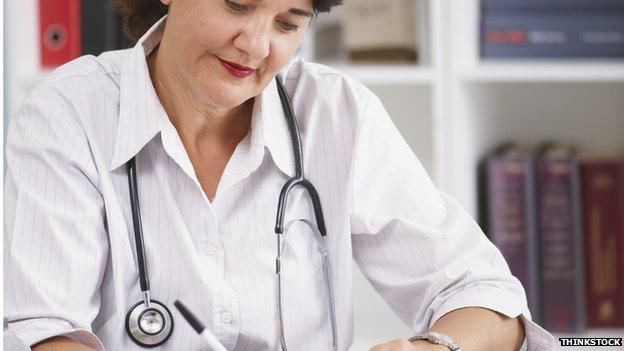Royal College warns of Scottish doctor shortage
- Published

Scotland could be short of at least 500 doctors by 2020, according to figures compiled by the Royal College of General Practitioners.
It said hundreds more doctors would be needed to cope with even the lowest estimates of population growth along with the number of GPs due to retire.
The Royal College has called for "immediate action" on the issue.
The Scottish government said the number of GPs employed in Scotland was the highest on record.
Based on the lowest estimates by the Office for National Statistics (ONS), the Scottish population is expected to increase by 123,000 by 2020.
'Radical thinking'
The Royal College of GPs said that, in order to provide the same doctor-to-patient ratio as we had in 2009, an additional 563 general practitioners will be needed by 2020. If the Scottish population grows by the ONS's highest estimates - 276,000 people - an extra 915 doctors would be needed.
The Royal College's predictions are based on the need to replace GPs who are retiring or moving abroad, as well as the need to serve a growing population. About 20% of the GP workforce is aged over 55 and likely to retire in the next 5 years.
Dr Miles Mack, the chairman of RCGP Scotland, said: "We need up to 915 more GPs in the next five years or we face a very different 2020 Vision than the Scottish government would wish to report.
"It takes five years after a first university medical degree to train a GP.
"We need immediate action and radical thinking if we are to save the system we have been so justly proud of."
Health Secretary Shona Robison said: "Under this government, the number of GPs employed in Scotland has risen by 6.9% to nearly 5,000 - the highest ever on record.
"We have also increased funding by 10% and there are more GPs per head of population in Scotland than in England.
"This government will continue to go on supporting and sustaining Scottish General Practice. For example, the recently agreed GP contract aims to give the profession stability over the next three years - reducing bureaucracy and allowing doctors to spend more time with patients."
Recruitment drive
The Royal College has also demanded more information on the whereabouts of £40m allocated by the Scottish government for primary care in 2015/16, and announced in November last year.
"Almost six months is a reasonable amount of time in which to consider the many options suggested for the fund's use." said Dr Mack.
"The government must now be transparent with their plans. Ministers have, so far, repeatedly referred to the fund in media and Holyrood debates.
"In order to plan effectively, GPs need to know where the funds are, how they are planned to be delivered and where they will be spent."
The Scottish government said work to recruit more trainee doctors and encourage more medical professionals into general practice would be supported by its new primary care fund with further announcements on this due shortly.
Figures produced by the NHS suggest the number of GPs has risen by 10% since 2004, but these figures do not take into account the fact that many more doctors are working part-time.
Statistics are not routinely collected on the number of part-time staff, but the most recent estimates suggest that, between 2009 and 2013, there was the equivalent of just 35 extra full-time staff.
'Under pressure'
Scottish Labour said GPs were "under real pressure".
The party's health spokeswoman Jenny Marra added: "We need more doctors to ensure people get the care and support they deserve. We also know the reliance on locums is hurting the public purse."
The Liberal Democrats said moving more care into the community would be impossible without "strengthening the frontline of our health service - local GPs".
Jim Hume MSP said: "The SNP government has taken its eye off the ball and now our local doctors have been left to struggle with fewer resources for growing patient registers."
Scottish Conservative health spokesman Jackson Carlaw said the current model of investment in primary care in Scotland was "failing".
He added: "We need a new model which encourages GPs to stay and others to return to Scotland."